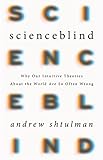Scienceblind : why our intuitive theories about the world are so often wrong / Andrew Shtulman.
Material type: TextPublisher: New York, NY : Basic Books, [2017]Description: viii, 311 pages : illustrations ; 25 cmContent type:
TextPublisher: New York, NY : Basic Books, [2017]Description: viii, 311 pages : illustrations ; 25 cmContent type: - text
- unmediated
- volume
- 9780465053940
- 0465053947
- Science blind
- Science -- Methodology
- Errors, Scientific
- Fallacies (Logic)
- Intuition
- Reasoning
- Intuition
- PSYCHOLOGY / Social Psychology
- PSYCHOLOGY / History
- PSYCHOLOGY / Developmental / General
- PSYCHOLOGY / Developmental
- PSYCHOLOGY / History
- PSYCHOLOGY / Social Psychology
- Errors, Scientific
- Fallacies (Logic)
- Intuition
- Reasoning
- Science -- Methodology
- Naturwissenschaften
- Wissenschaftstheorie
- Intuition
- Irrtum
- Fehlschluss
- 501 23
- Q175.32.R45 S48 2017
- PSY015000 | PSY031000 | PSY039000 | SCI075000
| Item type | Current library | Collection | Call number | Status | Date due | Barcode | Item holds | |
|---|---|---|---|---|---|---|---|---|
 BOOK
BOOK
|
Harrison Memorial Library NONFICTION | Adult Nonfiction | 501 SHT (Browse shelf(Opens below)) | Available | 31624003718558 |
Includes bibliographical references (pages 261-298) and index.
Why we get the world wrong -- Intuitive theories of the physical world : Matter: what is the world made of? How do those components interact? ; Energy: what makes something hot? What makes something loud? ; Gravity: what makes something heavy? What makes something fall? ; Motion: what makes objects move? What paths do moving objects take? ; Cosmos: what is the shape of our world? What is its place in the cosmos? ; Earth: why do continents drift? Why do climates change? -- Intuitive theories of the biological world : Life: what makes us alive? What causes us to die? ; Growth: why do we grow bigger? Why do we grow older? ; Inheritance: why do we resemble our parents? Where did we get our traits? ; Illness: what makes us ill? How does illness spread? ; Adaptation: why are there so many life-forms? How do they change over time? ; Ancestry: where do species come from? How are they related? -- How to get the world right.
Why do we catch colds? What causes seasons to change? And if you fire a bullet from a gun and drop one from your hand, which bullet hits the ground first? In a pinch we almost always get these questions wrong. Worse, we regularly misconstrue fundamental qualities of the world around us. In Scienceblind, cognitive and developmental psychologist Andrew Shtulman shows that the root of our misconceptions lies in the theories about the world we develop as children. They're not only wrong, they close our minds to ideas inconsistent with them, making us unable to learn science later in life. So how do we get the world right? We must dismantle our intuitive theories and rebuild our knowledge from its foundations. The reward won't just be a truer picture of the world, but clearer solutions to many controversies-around vaccines, climate change, or evolution-that plague our politics today.
There are no comments on this title.

